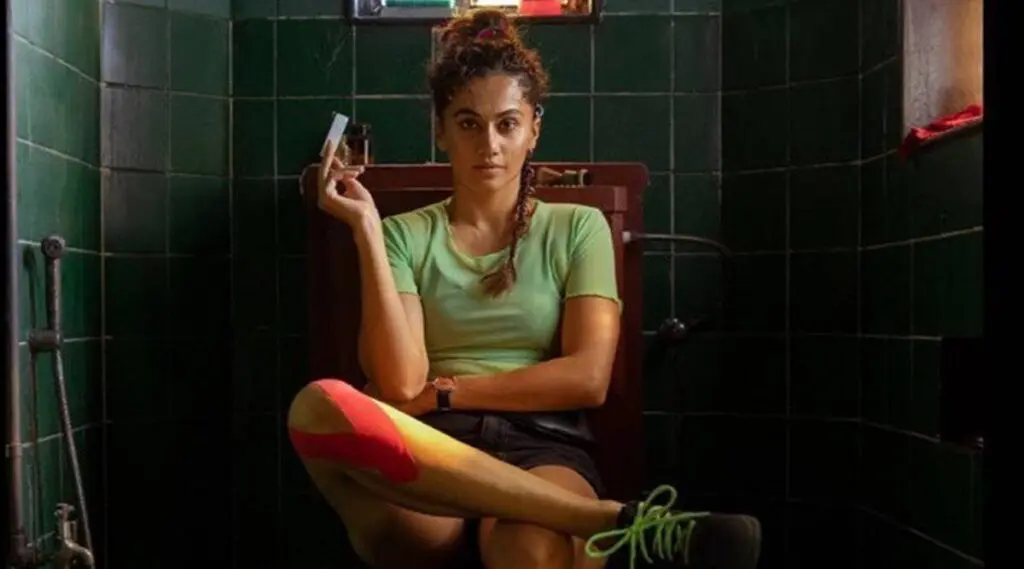Summary
A remake falls short as the core impact gets diluted with over-exposition and the urge to make it different from the original.
This review of the Netflix film Looop Lapeta does not contain spoilers.
In the queue of remaking foreign films recently, Netflix’s Indian film Looop Lapeta is the official remake of Tom Tykwer’s 1998 experimental film Run Lola Run. Starring Taapsee Pannu and Tahir Raj Bhasin in the lead roles, this film is directed by debutant director Akash Bhatia, Looop Lapeta is a mixed bag of emotions, comedy and romance. It tries to be different from the source material, but it falls into the trap of over exposition. As a result, it dilutes the potential core impact of the film.
It revolves around the story of Savi, who has 50 minutes to save his boyfriend’s life by getting 5 million Indian rupees. The narrative structure stays faithful to the original and divides the plot into three scenarios, each time a different ending. With each time, the character’s fate changes with the slightest changes in action. While the writers take this narrative device the same as the original; other concepts like the chaos theory, free will, and determinism are diluted. Instead, the writers incorporate several subplots with some quirky supporting characters. Though some of the characters’ punchlines work, it overall stretches the premise of the story. Though, from halfway down the line, they become less attractive. Unnecessary scenes prolong the running length. Sometimes the characters are too overdramatic and pretentious and it leads to exaggeration of the overall tonality.
Some technical experimentation tries to cover the damages with the screenplay; they also become repetitive and predictable from a certain point. With the dizzying effects of a snorricam or split screens with unusual camera angles, it looks pretty different from any other Bollywood mainstream movie stylistically. Also, the saturated lights and costumes with various shades of colour seduce you to enter this world of Savi and Satya. But the style overpowers the substance here, and it fails to give you the high you expect from an LSD trip.
Interestingly some homages are given to the original German film. Director Akash Bhatia cleverly inserts those elements into the movie, making it an exciting thing to watch. For example, a red-haired girl resembling Franka Potente’s look from Run Lola Run appears towards the end. In one scene, Savi’s father says, “My name is Borkar, not Banker”, ironically referencing the character’s occupation in the original movie.
Tahir Raj Bhasin is convincing in the role of Satya. It’s looking good that he is getting his place in the lead in the mainstream circuit after successfully doing some offbeat roles over the years. His comic timing is good with the pinch of slapstick; he indeed makes an impression. But the problem arises with the other half of the lead. Taapsee, on whom the entire story stands, gives an entirely flat performance. I feel a lack of energy in her action, and her treatment towards the character is very superficial. But the supporting characters such as Dibyendu Bhattacharya and Rajendra Chawla kill in their respective roles. As Satya’s boss Victor, Bhattacharya is quirky, whereas Chawla portrays the equally hilarious ‘harami’ (Hindi for rascal) businessman, Shree Mamlesh Charan Chaddhaji. Shreya Dhanwanthary gets a tiny cameo as a bride. In a scene, she delivers a monologue, which is astonishingly bewildering, which makes you want to hug her and kiss her and throw a glass of water on her face at the same time.
With the ending note, Looop Lapeta has an interesting premise with the template of the beautiful source material. But its over-excessive urge to go different from the original while claiming it’s an adaptation makes it a confusing ride. But if you are not familiar with the original film, you can give it a try.
What did you think of the Netflix film Looop Lapeta? Comment below.




